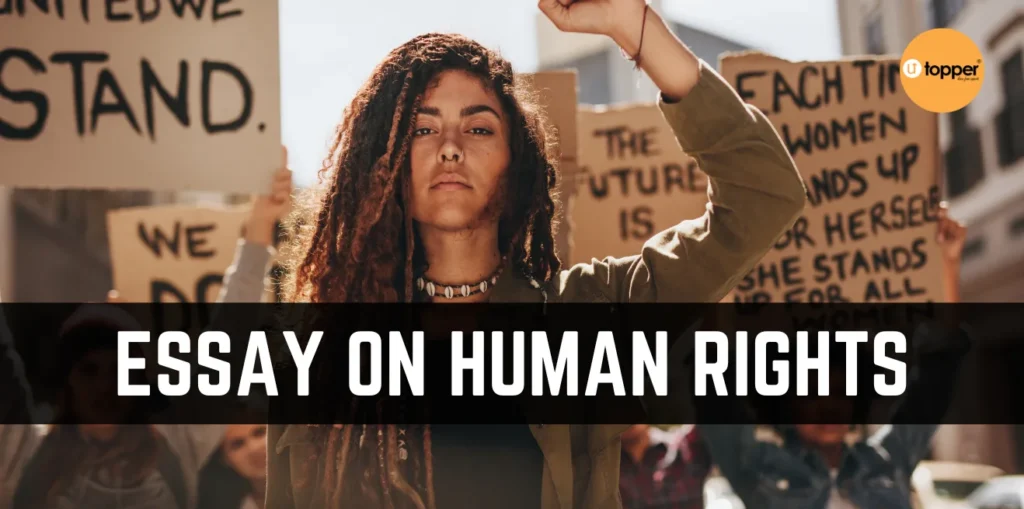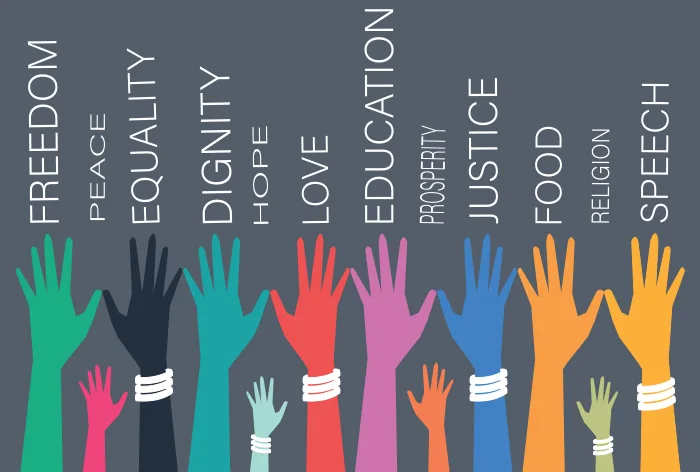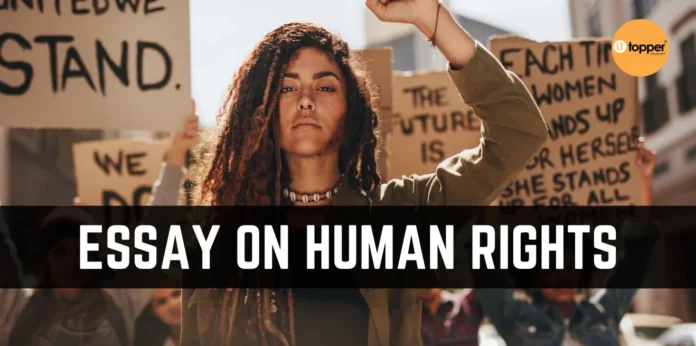
Human Rights Essay in English
Essay On Human Rights: Human rights are the basic rights and freedoms that everyone has a right to, no matter what race, gender, religion, nationality, or anything else they have. In this Essay On Human Rights, we will talk about human rights, our basic human rights, and the importance of human rights.
You can also find more Essay Writing articles about events, people, sports, technology, and many other things.
Human rights matter today. The Geneva Convention guarantees them fundamental rights. Every nation must guarantee human rights to its citizens, per the UN. States must also investigate human rights violations. With social media, most nations promise to protect their citizens’ human rights. However, its meaning and scope vary.
Human rights are basic freedoms. These rights are unconditional. Everyone should have human rights. Students can use our two sample essays for exams.
Long Essay On Human Rights for Students
Everyone is valuable. We value people by respecting their human rights. Human rights laws promote fairness and equality. It recognizes our right to make life choices and develop our potential. Living without intimidation, harassment, or discrimination is the goal. These rights protect human dignity. Human rights are universal regardless of gender, race, nationality, language, ethnicity, religion, etc.
Ancient philosophers and thinkers stressed individual freedom and liberty, which led to human rights. After the Second World War, the international community realized the need for a comprehensive human rights framework.
What are Human Rights

Humans have basic rights. Human rights make everyone equal regardless of age, gender, caste, creed, religion, or nationality. Due to WWII atrocities, the UN adopted human rights. The U.N. General Assembly adopted the Universal Declaration of Human Rights on December 10, 1948. (UDHR).
It established human rights as the basis for freedom, justice, and peace for all. Most nations have included these human rights in their constitutions and domestic laws, even though it’s not legally binding. Human rights protect our basic needs and prevent discrimination.
Basic Human Rights
Human rights fall into two categories. These include civil, political, social, economic, and cultural rights. Human rights are detailed here:
Right to Life
Earthlings have the right to live. The law protects the right to life. The death penalty, self-defense, abortion, euthanasia, and war limit this right.
Freedom of Speech
Publicly expressing opinions is a human right. Obscenity, slurs, and criminal provocation limit this right.
Freedom of Thought, Conscience, and Religion
Every nation grants its citizens the freedom to think and believe. An individual can also choose any religion and change it at any time.
Right to Fair Trial
This right guarantees a fair trial by an impartial court, the right to counsel, a public hearing, and interpretation.
Freedom from Torture
International law protects everyone from torture. Since the mid-20th century, this is illegal.
Freedom of Movement
This means that anyone in the state can travel, live, work, or study anywhere.
Freedom from Slavery
This right outlaws slavery and the slave trade. Unfortunately, illegal practices continue.
Violation of Human Rights
Human rights are violated even though everyone has them. State actions that ignore, deny, or abuse these rights violate them.
UN committees monitor human rights violations. To protect basic rights, many national institutions, non-governmental organizations, and governments monitor these.
These organizations educate people about human rights. They protest inhumane practices. Protests have often spurred action and improved the situation.
The 1948 UN General Assembly’s Universal Declaration of Human Rights outlines everyone’s basic rights and freedoms. The declaration includes civil and political rights like free speech, a fair trial, and voting. Economic, social, and cultural rights include education, work, and health.
Democracy, justice, and equality require human rights. They create a just and fair society where people can exercise their freedoms without fear of persecution or discrimination. Human rights empower people to live fulfilling lives and contribute to their communities.
Human rights violations continue worldwide despite recognition and protection. Discrimination, torture, arbitrary detention, and extrajudicial killings are human rights violations. Governments, armed groups, and corporations commit these abuses.
Governments, civil society, and individuals must work together to protect and promote human rights. Governments must uphold and defend human rights, but civil society organizations and individuals can help.
Human Rights Categories
Civil and political rights and social rights comprise human rights. This classification helps clarify human rights. They also show people their various roles.
Civil and political rights are human rights. These rights limit government power that could affect individual freedom. These rights also let people influence the government. Besides lawmaking.
Next, social rights encourage the government to plan ways to improve citizens’ lives. All governments must protect their citizens. Human rights aid nations.
Importance of Human Rights
Human rights are crucial to national and personal development. Basic human rights include life, religion, movement, and more. Human well-being depends on each right.
Human rights protect life. It guarantees your safety. Thus, citizens are free to practice any religion. It also implies free thought.
Free movement aids mobilization. It ensures everyone can travel and live in any state. You can seize opportunities anywhere.
Next, human rights guarantee fair trials. Everyone has the right to go to court for impartial decision-making. When all else fails, the court will provide justice.
Most importantly, human slavery is over. Nobody can enslave them. Humans can also speak their minds.
Summary
Finally, human rights promote democracy, justice, and equality. Universal, inalienable, and indivisible, they underpin a just and fair society. Many countries still violate human rights, despite progress.
Governments, civil society organizations, and individuals must work together to protect and promote human rights and ensure that everyone can exercise their freedoms without persecution or discrimination.


